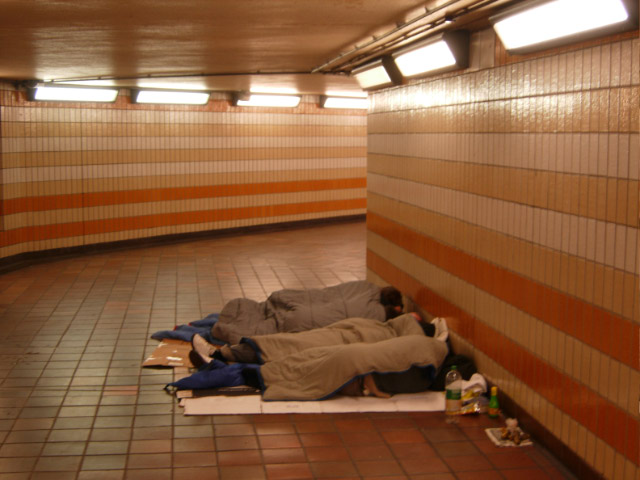Shelter’s expert Strategic Litigation team has recently been involved in an important case clarifying people’s rights when homeless. This should give people with EU pre-settled status more certainty and give councils a blueprint for how to help more people and families out of homelessness.
People with pre-settled status under the EU Settlement Scheme who have no other right of residence are often in the most desperate circumstances of any group of people who turn to Shelter’s services for help.
They often aren’t able to show that they had exercised a right to reside under EU law before the Brexit transition period ended on 31 December 2020, that they continued to be resident on that date, and that they have had residence rights under the UK’s EU Withdrawal Agreement since then. Without proof of this, they are ineligible for statutory homelessness assistance from the local council.
They may have caring responsibilities, be unable to work due to ill health, or may have fled domestic abuse. This can result in people becoming homeless and without income, if the Department for Work and Pensions has made the same decision as the local authority. Despite having lawful residence in the UK with pre-settled status, they have no clear way to find accommodation.
Sometimes social services provide accommodation for families with children or for those with medical needs. However, this accommodation is often very insecure and unsuitable, such as a room at a bed and breakfast, and they have no rights to be helped into a suitable, settled home as they would under homelessness legislation.
In a recent county court homeless appeal, Shelter’s Strategic Litigation team represented a woman known as ‘C’, who was not a UK or EU citizen. C was dependent on her daughter, who was an EU citizen in work. She was granted pre-settled status under the EU Settlement Scheme on that basis. C is an older person with health issues who couldn’t work.
When C could no longer remain in her daughter’s accommodation, she faced homelessness and approached the council for help. The council rejected her application on the basis she was ineligible as someone who had pre-settled status, but did not have a qualifying EU right to reside as a dependant family member. Shelter submitted a statutory review of this decision to deny C eligibility, but the council upheld its original decision.
Shelter helped C to appeal this decision in the county court. As a result of the wider issues that the appeal raised, the Independent Monitoring Authority, the 3million, and the AIRE Centre were all granted permission to intervene to make legal submissions.
At the hearing, Shelter, the 3million and the AIRE Centre argued that C was eligible on the basis that she could rely on the EU Withdrawal Agreement (WA). C asserted that she met the personal and material requirements of the WA, which allow her to keep her right to live in the UK after the Brexit transition period ended on 31 December 2020. She argued that her residence rights continued after Brexit because they were acknowledged when she was granted pre-settled status. Based on this, C argued that she should be treated the same as a British citizen under the non-discrimination and equal treatment provisions of the WA, making her eligible for homelessness assistance. It was also argued that the council had failed to check whether the refusal of homelessness assistance breached C’s fundamental rights under the EU Charter of Fundamental Rights (‘CFR’), which were protected under the WA.
The court found that as C was previously a dependant family member before Brexit, she did have a right of residence under the WA and as such, she was entitled to rely on the equal treatment provisions of the WA. On this basis, the court confirmed that C should have been found eligible for homelessness assistance and the appeal was therefore allowed. The court also found that even if C had not been eligible for assistance via the equal treatment provisions of the WA, the council should have checked whether her rights under the CFR would have been breached.
Shelter welcomes the judgment. This judgment will go a long way towards preventing people with EU pre-settled status from falling through gaps when homeless. What this judgment asks councils to do is to fully consider people’s individual circumstances and the mitigating factors instead of applying a ‘one size fits all’ rule to homeless applications and decisions.
As this is a county court judgement and is not binding, we encourage local authorities to follow the decision and recognise that those with pre-settled status who were dependant family members before Brexit are automatically eligible for homelessness assistance. This will not only create certainty for the people involved, but will also mean that local authority homelessness officers will not have to undertake painstaking and costly fact-finding exercises to determine whether someone is eligible for assistance or not under the CFR.
For those with pre-settled status who were not a dependant family member, and are not currently exercising a right of residence under EU law, local authorities should also follow the judgment to determine their eligibility for assistance on an equal treatment basis. If they are not automatically eligible, authorities should properly assess whether their CFR protections require them to be found eligible for homelessness assistance.
Join the fight to end the housing emergency
We really need your help to support more people to enforce their rights and get the help they need when homeless, at risk or homelessness or living in poor conditions. Here’s what you can do:
- please donate so we can continue to provide advice and support to people at the sharp end of the housing emergency
- please support our campaign reminding party leaders that our votes will only be won with a promise to rebuild our broken housing system
Thanks to the kindness and solidarity from supporters like you, we can end the housing emergency together.

